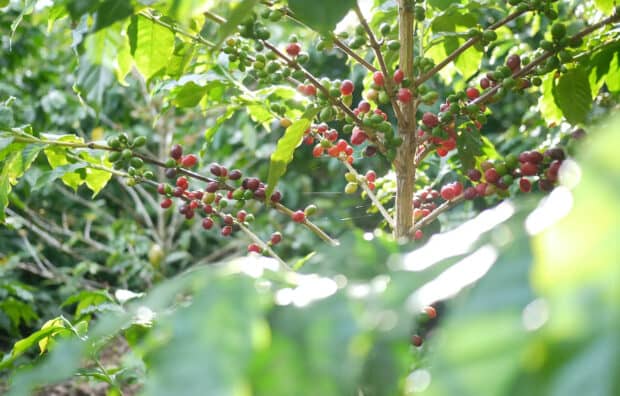[[{“value”:”
An F1 hybrid plant at the time of its first production harvest. Flor Amarilla Research farm in El Salvador, 2019. World Coffee Research press release photo.
The nonprofit World Coffee Research (WCR) announced the launch of a “pre-commercial trial phase” of new F1 hybrid arabica coffee varieties that have demonstrated potential for high quality, high productivity, disease resistance and climate resiliency.
Private companies participating in the new six-year trial phase include U.S. roasters such as Starbucks, Nestlé-owned Blue Bottle Coffee and Counter Culture Coffee, as well as numerous green coffee production and trading companies.
WCR launched the F1 project in 2015, exploring long-term breeding and cultivation solutions through first-generation hybrid (F1) crosses of existing arabica coffee plant lines. The program responds to threats faced by coffee growers such as the arabica coffee species’ susceptibility to pests and disease and lack of resiliency to climate change.
Following years of development and testing, WCR selected four F1 hybrids — each crosses of Gesha and Sarchimor lines — to move on to the pre-commercial testing phase.
Related Posts
WCR funding primarily comes from private companies within the coffee industry. The new pre-commercial phase follows a private bidding and selection process among WCR members. WCR did not share any financial details regarding the bidding process.
“The bidding was guided by technical requirements such as location and the company’s ability to establish the trial in itself — the trees have to be imported, taken care of in a nursery, planted following the specific experimental design, etc.,” Emilia Umaña, the senior manager of WCR’s nursery program, told Daily Coffee News.
In total, the trial will involve 10 trial plots in three countries — Costa Rica, Guatelama and Peru — where 10,000 hybrid plants will be tested. The plants have been propagated by the tropical agricultural research institute CATIE in Costa Rica through a process known as somatic embryogenesis.
Companies participating in the new trials include:
North Carolina-based roasting company Counter Culture Coffee, in collaboration with Costa Rica’s Aquiares Estate;
Guatemalan green coffee company Cafcom;
California-based Blue Bottle Coffee, in collaboration with green coffee trader Los Volcanes;
The Peru branch of green trader Falcon Coffees, in collaboration with Peruvian producer cooperative CENFROCAFE;
and Starbucks’ Alsacia Farm and green trading giant Volcafe’s Peru business, in collaboration with Starbucks.
“With this new cycle of evaluation we are looking to learn more of how these hybrids perform in real-life environments in farmer fields and determine if any of them can add value for coffee production in the future,” Umaña said in an recent announcement of the new phase. “Additionally, we want to better understand the system for incorporating new materials responsibly into the market — paving the way for many future releases.”
WCR said that should F1 varieties outperform comparison varieties over the next six years, the group “aims to work with the coffee community to develop plans for distribution models to scale-up access to these varieties.”
The F1 project is running alongside WCR’s landmark Innovea coffee breeding project, which launched in 2022 with nine participating countries.
Comments? Questions? News to share? Contact DCN’s editors here.
Nick Brown Nick Brown is the editor of Daily Coffee News by Roast Magazine.
“}]]


